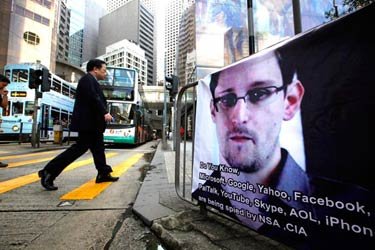Gordon Chang notes the numerous details pointing to Snowden operating in collaboration with China.
By that time, there was no point for China to give Snowden a Beijing palace where he could pet phoenixes.
“Ask yourself: if I were a Chinese spy, why wouldn’t I have flown directly into Beijing? I could be living in a palace petting a phoenix by now.” So wrote Edward Snowden in the middle of last month, in a live chat with readers of London’s Guardian.
Today, the famous 30-year-old cuts a pathetic figure, presumably still marooned in the transit zone in Moscow’s Sheremetyevo International Airport. He has, we are told, remained there since June 23, when he arrived, without passport or Russian visa, on an Aeroflot flight from Hong Kong. Snowden, through the assistance of the WikiLeaks organization, has filed a reported 27 requests for asylum. Venezuela’s president, Nicolas Maduro, offered him refuge on Friday, and Bolivian leader Evo Morales followed suit on Saturday, but China has yet to welcome him.
Beijing’s refusal to accept Snowden suggests he is not a Chinese agent, at least if we accept the premise of his argument outlined for the readers of the Guardian. Nonetheless, there are aspects of his relationship with the People’s Republic of China that are, at the very least, unsettling.
As an initial matter, China may have helped him gather information from the National Security Agency. Sources in the American intelligence community suspect the famous “leaker” was really a “drop box,” receiving information from others in NSA who were working for China. It was his job to act as the courier.
This theory explains how Snowden could possess information to which he did not have access. It is possible he figured out how to bypass barriers in NSA’s systems, but it is more likely he had help. Eli Lake of the Daily Beast reports that the FBI is investigating whether Snowden obtained documents “from a leak inside the secret FISA court.” Similarly, Mike Rogers, chairman of the House Select Committee on Intelligence, has suggested Snowden probably had an accomplice in the NSA who gave him information.
Beijing may also have encouraged Mr. Snowden to leave Hawaii. One of my sources indicates that Chinese intelligence, either directly or through FBI personnel working for China, tipped Snowden off that NSA investigators were closing in on him.
There still is no proof of this allegation, but it is telling that Snowden chose to run to Hong Kong. At first glance, that city is a curious choice for someone trying to avoid American justice. It has the equivalent of an extradition agreement with the U.S. — as a non-sovereign it technically “surrenders” suspects, not extradites them — and a well-known history of close cooperation with American law enforcement. The Guardian, referring to Snowden, stated that “he believed that it was one of the few places in the world that both could and would resist the dictates of the U.S. government.” In view of Hong Kong’s record of regularly turning over suspects to America, this had to mean Snowden thought Beijing would step in to protect him.
Why would he ever think that? It seems clear that Snowden, if he did not actually work for the Chinese, at least did their bidding. He insisted, for instance, that the Washington Post time its initial disclosures so that they would occur on the eve of last month’s “shirtsleeves” summit between President Obama and his Chinese counterpart, Xi Jinping. When the Post refused to give a guarantee — we learned this from Wolf Blitzer’s June 10 interview with the paper’s Barton Gellman — Snowden dealt mostly with the Guardian, which evidently proved to be more pliable. The timing of the Guardian’s disclosures benefited the Chinese enormously, changing the global narrative from Chinese hacking to American surveillance. …
The Chinese then did their best to make sure that American officials did not get the opportunity to interrogate Snowden. The last thing they wanted was for the U.S. to have the opportunity to learn the extent of China’s penetration of the NSA and the FBI in Hawaii. Therefore, they ensured he left Hong Kong before the city could “surrender” him. Albert Ho, one of Snowden’s attorneys, has publicly stated that Beijing approached him through intermediaries who said his client should leave Hong Kong. And as we know by now, this is exactly what Snowden did.
By that time, there was no point for China to give him a Beijing palace where he could pet phoenixes. Ministry of State Security agents had been in contact with Snowden while he was in Hong Kong and probably obtained all they wanted from his four laptops and one thumb drive. Bill Gertz of the Washington Free Beacon reports that U.S. officials say Russian and Chinese intelligence operatives obtained access to, in the words of Gertz, “highly classified U.S. intelligence and military information contained on electronic media” held by Snowden.
At this moment, we do not know whether Snowden, during his time in Hong Kong, actually traveled to China, as some believe, and we do not know the extent of his dealings with the Chinese. Yet the information we do possess — and the suppositions we can reasonably make — point to troubling conclusions.
Read the whole thing.






Please Leave a Comment!